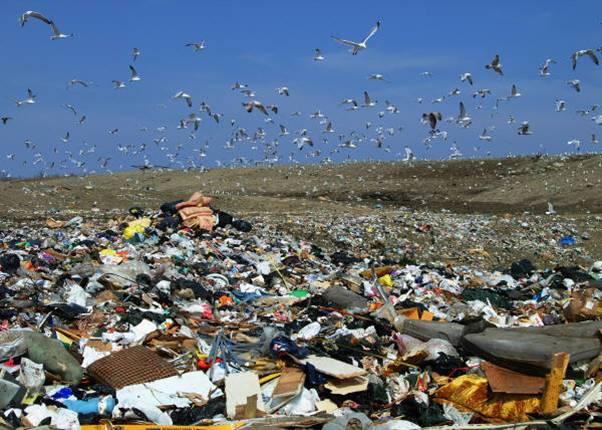
You don’t have to be a tree-hugger to recognize the fact that we can’t forever continue to take raw materials out of the Earth, use a lot of energy to convert them into briefly-useful products and then pile them into huge landfills. If you understand that, then you get the gist of what sustainability is about. A sustainable future is one where nothing is wasted. Indeed, the idea of zero waste, whether we’re talking about factories or homes, has already taken root.
That means we could find ourselves in a place in the not-too-distant future, where we have no more need for landfills. While that would be a glorious achievement, there are those who could find it a hardship.
That would include those like 13-year-old Inusa Mohammed and his friend Kwesi Bido, who is a year older. The two of them spend their afternoons scrounging through the Agbogbloshie landfill in Accra, the capital city of Ghana, looking for bits of copper or electronic remnants that they might be able to exchange for a few coins. The boys will burn the plastic insulation off the wiring to collect the precious copper inside, heedless of the dangers that dwell within the toxic fumes. The dump is full of other dangers -- ranging from broken glass to exploding aerosol cans, to the ubiquitous lead that lurks inside of old and broken computer monitors as well as arsenic and mercury and other deadly toxins.
Agbogbloshie, and places like it, represent the end of the road for your old computer, cell phone or TV. Electronics recyclers here at home are often overwhelmed, especially with things like old cathode ray tube (CRT) monitors and TVs for which there is no longer a market. That means some of it gets shipped off, albeit illegally, to places like this.
Twenty years ago, this parched field used to be a lush mangrove swamp.
This scavenging provides meager earnings for the boys, who use the money for what was supposed to be free school. In a way they play the same role that some creatures do in the forest, breaking down the waste and returning it into the food chain. Trucks carry the scrap off to a port city, for which they might receive $200 for 5 tons. These materials are then reprocessed to be sent back through the economy once again as new items, only to find their way back to places like this over time.
Both electronics consumption and recycling are growing. In the state of Washington, for example, per capita generation of electronics waste grew from 5.9 pounds to 24.4 pounds (per person, per year) from 2003 to 2012. Over the same period, electronics recycling grew from 1.2 pound to 11.2 pounds per person, per year. That means that recycling as a percentage of waste generated grew from 20 percent to 46 percent. The fact that major retailers like Best Buy and Staples are taking back old items, in some cases for store credit, will certainly help increase participation.
Still, it’s a big hill to climb. Electronics waste is the fastest growing category of waste. By some estimates, only 10 percent of households recycle old electronics. But the fact that there is inherent value in many of these items will provide strong incentive to collect them. Transparency Market Research found that the electronics recycling market can be expected to grow from $9.84 billion in 2012 to $41.36 billion in 2019. That represents an increase from 48.4 million tons to around 141 million tons. Much of that growth is expected to come from Europe and Asia, though based on the data from Washington and the growing involvement of retailers, the U.S. seems to be catching up.
This could mean that Inusa and Kwesi and the thousands of others like them might have to find new ways to support themselves, but hopefully the transforming economy will provide those opportunities in ways that are safer and ultimately more beneficial. Perhaps there will come a day when the two of them will raise their families working to build a sustainable economy in Accra, and as they pass by a lush restored mangrove swamp, they can tell their children that this once used to be a dump.
Image credit: Louise Falcon: Flickr Creative Commons
RP Siegel, PE, is an author, inventor and consultant. He has written for numerous publications ranging from Huffington Post to Mechanical Engineering. He and Roger Saillant co-wrote the successful eco-thriller Vapor Trails. RP, who is a regular contributor to Triple Pundit and Justmeans, sees it as his mission to help articulate and clarify the problems and challenges confronting our planet at this time, as well as the steadily emerging list of proposed solutions. His uniquely combined engineering and humanities background help to bring both global perspective and analytical detail to bear on the questions at hand.
Follow RP Siegel on Twitter.

RP Siegel (1952-2021), was an author and inventor who shined a powerful light on numerous environmental and technological topics. His work appeared in TriplePundit, GreenBiz, Justmeans, CSRWire, Sustainable Brands, Grist, Strategy+Business, Mechanical Engineering, Design News, PolicyInnovations, Social Earth, Environmental Science, 3BL Media, ThomasNet, Huffington Post, Eniday, and engineering.com among others . He was the co-author, with Roger Saillant, of Vapor Trails, an adventure novel that shows climate change from a human perspective. RP was a professional engineer - a prolific inventor with 53 patents and President of Rain Mountain LLC a an independent product development group. RP was the winner of the 2015 Abu Dhabi Sustainability Week blogging competition. RP passed away on September 30, 2021. We here at TriplePundit will always be grateful for his insight, wit and hard work.














